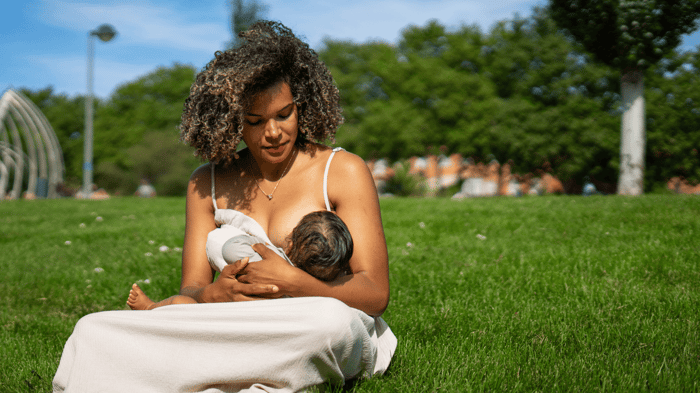Table of Contents
- The Biology Behind Postpartum Dryness
- How Long Does It Last? The Short Answer
- The Long Answer: Phases of Recovery
- The Emotional Toll of Waiting
- The Role of Breastfeeding
- Coping in the Meantime: Comfort Strategies That Work
- Daily Life With Dryness
- The Partner’s Role
- Why Talking About It Matters
- Patience With a Purpose
- FAQs
After giving birth, mothers are handed endless advice—how to swaddle, when to nurse, what stroller to buy. But tucked away in whispers or late-night Google searches is a quieter, more personal question: When will my body feel like mine again?
For many women, one of the most frustrating and least-discussed postpartum symptoms is vaginal dryness. It’s uncomfortable, sometimes painful, and it lingers long enough to make women wonder if it’s permanent. Yet despite its prevalence, it remains cloaked in silence.
This blog exists to give that question—“How long does postpartum vaginal dryness last?”—the thorough, honest answer it deserves. Not just with timelines, but with context, empathy, and real solutions. Because postpartum life is not just about caring for a baby. It’s also about caring for the mother who made that baby possible.
The Biology Behind Postpartum Dryness
To understand how long vaginal dryness lasts, it is essential to understand the underlying causes. After delivery, the body undergoes a rapid hormonal recalibration. Estrogen and progesterone levels, which were sky-high during pregnancy, plummet.
Estrogen, in particular, is the hormone responsible for keeping the vaginal walls thick, elastic, and lubricated. Without it, tissues become thinner, more fragile, and less naturally moist. For breastfeeding mothers, prolactin levels rise to stimulate milk production, and prolactin suppresses estrogen even further. The result? Dryness that persists well beyond the first few weeks of recovery.
This isn’t the body malfunctioning. It’s the body prioritizing. In nature’s eyes, milk for the baby takes precedence over preparing the body for fertility.
How Long Does It Last? The Short Answer
Here’s the truth: there is no universal timeline. For some women, vaginal dryness eases a few weeks after birth as hormone levels begin to normalize. For others, it lingers throughout the breastfeeding journey, sometimes lasting a year or more.
A woman who isn’t breastfeeding may notice improvement sooner as estrogen levels rebound. A mother who breastfeeds exclusively may continue to experience dryness until she begins to wean. Even then, the pace of recovery varies. Genetics, overall health, birth complications, and stress all play a role.
So, the short answer is this: postpartum vaginal dryness can last anywhere from a few weeks to over a year. And while that variability can be frustrating, it also means women have options to support comfort along the way.
The Long Answer: Phases of Recovery
Dryness after childbirth doesn’t follow a straight line. It often unfolds in stages:
Weeks 1–6 (Immediate Postpartum)
Estrogen is at its lowest. Women recovering from tears or stitches may feel especially uncomfortable, and dryness adds to the sensitivity. Intimacy often feels off the table, not just physically but emotionally.
Weeks 6–12 (Early Recovery)
If not breastfeeding, estrogen may slowly rise, and some improvement is noticed. For breastfeeding mothers, dryness tends to persist. This is also when many couples attempt intimacy again, often running into unexpected discomfort.
3–6 Months (Sustained Breastfeeding)
Prolactin continues to keep estrogen low. Dryness is still common, especially in women exclusively nursing. Some report gradual improvements, but for others the discomfort feels unchanged.
6–12 Months (Weaning Phase)
As breastfeeding decreases, estrogen begins to rebound. Vaginal tissues regain elasticity and lubrication. For many, this is the turning point.
Beyond 1 Year: For women who breastfeed long-term, dryness may continue until full weaning. Once hormonal balance returns, most women notice significant relief.
Understanding these phases helps normalize the experience. It’s not forever—it’s a cycle tied to hormones and breastfeeding patterns.
The Emotional Toll of Waiting
Knowing the biology is one thing. Living through it is another.
Vaginal dryness affects more than the body—it impacts confidence, intimacy, and even mental health. Some women describe feeling “trapped in a stranger’s body,” mourning the ease of their pre-pregnancy selves. Others admit to avoiding sex out of fear of pain, leading to guilt or distance from their partners.
One mother put it bluntly: “I could nurse for hours without complaint, but the thought of intimacy made me want to cry.”
The wait for comfort can feel endless. That’s why emotional validation matters just as much as physical solutions. Telling mothers, “This is normal, it’s not your fault, and it will get better,” is a lifeline.
The Role of Breastfeeding
Breastfeeding is both miraculous and merciless. While it nourishes the baby and strengthens maternal bonds, it prolongs vaginal dryness for many women. The same prolactin that stimulates milk actively suppresses estrogen, ensuring dryness lingers as long as nursing is frequent.
This doesn’t mean breastfeeding is the problem—it means awareness is the solution. Mothers who understand the link can make informed choices: whether to use supportive products, adjust intimacy expectations, or simply remind themselves that this is a phase, not a life sentence.
Coping in the Meantime: Comfort Strategies That Work
Waiting for hormones to rebalance doesn’t mean suffering in silence. There are effective, safe ways to ease dryness during the postpartum period:
Moisturizers and lubricants: Using them is not a failure; it’s practical self-care.
Natural support: Supplements like She Juicy offer plant-based, hormone-free relief, restoring vaginal moisture without interfering with breastfeeding.
Pelvic floor therapy: Physical therapists trained in postpartum recovery can help with not just dryness, but also pain, scar tissue, or tension.
Open conversations with partners: Saying, “I want to be close, but I need more support,” keeps intimacy alive while the body heals.
These aren’t band-aids—they’re bridges. They allow women to live fully while waiting for their bodies to catch up.
Daily Life With Dryness
Dryness isn’t only about intimacy. For some women, it shows up in daily life—burning when walking long distances, irritation from tight clothing, or discomfort after exercise. Small choices make a difference: breathable fabrics, gentle cleansers, and hydration can all support comfort.
By reframing dryness as more than a “bedroom issue,” women can see the bigger picture: caring for vaginal health is part of caring for overall health.
The Partner’s Role
Vaginal dryness may live in one body, but it lives in a relationship too. Partners who don’t understand the hormonal link may misinterpret avoidance as disinterest.
Honest conversation changes everything. When women explain, “This isn’t about desire, it’s about comfort,” partners can shift from frustration to empathy. And when partners show patience, affection, and willingness to explore new ways of connecting, couples often emerge stronger.
Men and partners need this education, too. Vaginal dryness isn’t rejection—it’s biology.
Why Talking About It Matters
Silence is the reason so many women think they’re alone in this. In reality, studies suggest that up to half of breastfeeding mothers experience vaginal dryness. That’s not rare—it’s common.
By speaking about it openly, whether in mom groups, medical visits, or online forums, women transform isolation into solidarity. And when the topic is normalized, the question, “How long will this last?” no longer feels shameful—it becomes part of the expected conversation around postpartum recovery.
Patience With a Purpose
So, how long does postpartum vaginal dryness last? The answer is fluid—weeks for some, months or even a year for others, especially during breastfeeding. But what’s consistent is this: it is not forever.
In the meantime, women don’t need to suffer in silence. With natural supports, open communication, and a culture that normalizes these conversations, postpartum dryness becomes less of a burden and more of a phase.
Because healing isn’t just about waiting—it’s about finding comfort, confidence, and connection in the journey back to yourself.
FAQs
Is postpartum vaginal dryness permanent?
No. For most women, it’s temporary and tied directly to hormonal shifts after childbirth, especially during breastfeeding. Once estrogen levels rise again, tissues typically recover.
Does dryness mean something is wrong with me?
Not at all. Vaginal dryness after birth is a natural side effect of low estrogen. It doesn’t mean your body is broken—it means it’s prioritizing milk production and healing.
Will it go away if I stop breastfeeding?
For many women, yes. Once breastfeeding decreases or ends, estrogen begins to rebound, and dryness improves. But recovery speed varies from person to person.
Can I do anything to speed up recovery?
Yes. Using natural lubricants, vaginal moisturizers, and supplements like She Juicy can support comfort while your hormones balance. Staying hydrated, managing stress, and seeking pelvic floor therapy can also help.
What if the dryness doesn’t go away after weaning?
If symptoms persist beyond weaning, consult your healthcare provider. While most cases are hormonal, persistent dryness could point to other conditions that deserve medical attention.









